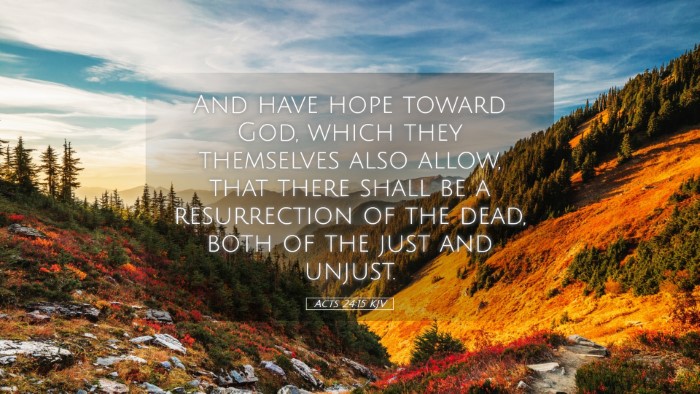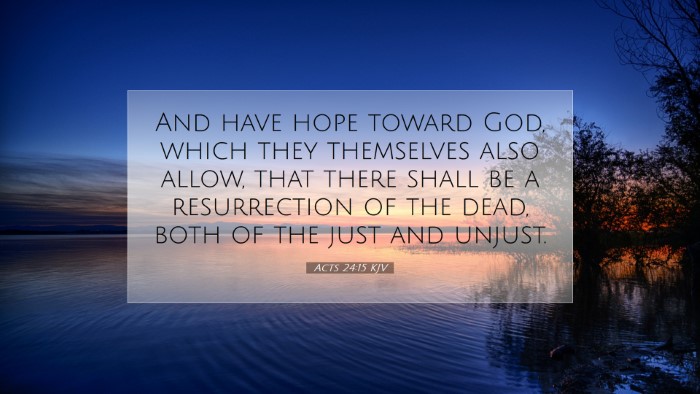Old Testament
Genesis Exodus Leviticus Numbers Deuteronomy Joshua Judges Ruth 1 Samuel 2 Samuel 1 Kings 2 Kings 1 Chronicles 2 Chronicles Ezra Nehemiah Esther Job Psalms Proverbs Ecclesiastes Song of Solomon Isaiah Jeremiah Lamentations Ezekiel Daniel Hosea Joel Amos Obadiah Jonah Micah Nahum Habakkuk Zephaniah Haggai Zechariah MalachiActs 24:15
Acts 24:15 KJV
And have hope toward God, which they themselves also allow, that there shall be a resurrection of the dead, both of the just and unjust.
Acts 24:15 Bible Commentary
Acts 24:15 Commentary
In Acts 24:15, the Apostle Paul asserts, “And have hope toward God, which they themselves also allow, that there shall be a resurrection of the dead, both of the just and unjust.” This verse encapsulates the core Christian belief in the resurrection, a principle that not only undergirds Paul's defense before Felix but also serves as a cornerstone of Christian theology.
Contextual Analysis
This verse is situated within Paul’s defense against accusations made by the Jewish leaders before the Roman governor Felix. Understanding the political and religious context of the time is crucial for grasping the weight of Paul's declaration.
- Historical Setting: Paul is in prison, accused of instigating riots and promoting sectarianism among Jews. His statement regarding resurrection is strategic, appealing to a shared belief among Jews.
- Theological Implication: Paul emphasizes the resurrection, a doctrine that was divisive between Pharisees and Sadducees (Acts 23:8), and thus employs it to assert his innocence and righteousness before Felix.
The Resurrection of the Dead
Paul’s declaration about the resurrection of the dead leads to profound theological implications:
- Hope of Resurrection: Both Matthew Henry and Albert Barnes emphasize that this hope is fundamental to the Christian faith, offering believers assurance of eternal life beyond physical death.
- The Just and Unjust: Adam Clarke notes that Paul points out the duality of the resurrected, highlighting both the righteous, who will receive eternal life, and the unjust, who face judgment. This serves as a reminder of moral accountability.
Insights from Commentaries
The observations made by various theologians deepen our understanding of Paul's message:
- Matthew Henry: He emphasizes that the resurrection gives Christians a hope that transcends temporal struggles, asserting that the anticipation of resurrection should influence moral conduct and encourage steadfastness in faith.
- Albert Barnes: Barnes articulates that the resurrection affirmed by Paul underscores God's justice. This assurance highlights that God will ultimately right all wrongs and reward faithfulness, establishing a divine order.
- Adam Clarke: Clarke’s commentary suggests that this passage underlines the notion that resurrection is not merely a theological concept but has practical implications — encouraging believers to live righteously in anticipation of God's judgment.
Pastoral Applications
This verse presents multiple avenues for pastoral application:
- Encouragement in Trials: The hope of resurrection should be a source of comfort for believers facing persecution or suffering, reminding them of the eternal glory that awaits.
- Moral Accountability: The verse serves as a call to preach the importance of righteous living, encouraging church members to reflect on their actions in light of the coming resurrection.
- Evangelistic Opportunity: Engaging with the concept of resurrection can lead to evangelistic conversations with those uncertain about their faith, allowing for discussions about ultimate hope and divine justice.
Theological Implications
Acts 24:15 offers rich theological insights worth exploring further:
- Doctrine of Resurrection: The resurrection serves as a foundational belief across Christianity, informing Christology, eschatology, and soteriology.
- God's Sovereignty: The certainty of resurrection underscores God's sovereign plan for humanity, demonstrating His authority over life and death.
- Unity of Believers: The shared hope of resurrection amongst Christians fosters unity, encouraging believers to come together in faith and mission.
Conclusion
Acts 24:15 illustrates the intersection of hope, justice, and resurrection. Paul’s articulation of these themes before Felix stands as a testament to the essential doctrines of faith that shape Christian belief and practice. By exploring the implications of this verse, pastors, students, theologians, and scholars can deepen their understanding of resurrection's significance in the narrative of Scripture and its practical relevance in the lives of believers today.


